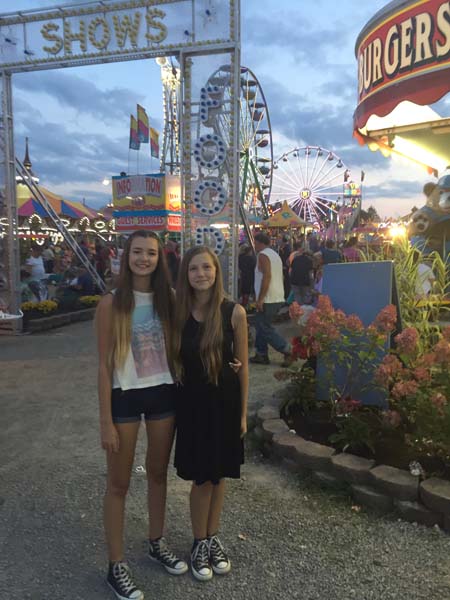Fair Minded
By Anna Dickson James

Sonora (left) and Shelby James of Charleston visit the State Fair of West Virginia in 2015. Photo by Anna Dickson James.
My girls and I were born in big cities. I was born in Tucson, had my oldest in Philadelphia, and my youngest in Seattle. We got used to the cement, bustling activities, and neighbors so close we could hear them flush their toilets and change their TV channels. Where we live now on the East End of Charleston, squirrels and stray cats are the only wildlife, and our “green space” is a 5 x 3-foot patch of dirt outside our rented apartment. I struggle to keep spindly, dehydrated impatiens alive and toss away the unopened seed packets I buy each fall with good intentions. Our one thriving plant I can’t even identify. It is invincible and needs no care except pruning, but I let it grow so wild that it spills onto the sidewalk. A neighbor once clipped it down when I wasn’t home.
We’re city girls, through and through, and isolated from the world of agriculture that produces our fruits and vegetables, meat, and other necessities. We could easily be convinced that magic is responsible for the jars of honey, cans of beans, and boxes of meat we buy at Kroger—instead of an army of workers, backed by science, who create these products for our table.
By the time we city types pay for our pork chops in tidy Styrofoam containers, we’re so disconnected from their origins, it would be easier to picture farmers picking neat, bloodless chops off trees instead of the reality: live animals being herded for slaughter and processing. Our blackberries could have been spat like Skittles from a machine into flimsy plastic containers rather than plucked from prickly bushes warming in the sun. Intellectually, we know where our food comes from, but there’s a heart-separation. The hard work of harvesting and preparing the food for consumption has been done for us.
But for my citified daughters and their citified mom, that distance between the origins of our food and our supper table might as well be like driving to the moon. That’s why our annual pilgrimage to the State Fair of West Virginia means so much to us. We don’t just get a lesson in agriculture at the fair; it’s far more than that. For us, the fair is a magical place, enticing enough to lure my girls off their phones and away from their friends. For this one day every year, my daughters and I feel more connected with one another, with our state, and with our community.
When my girls and I visited the fair last summer—as we’ve done every August since 2010—we experienced all the usual things. We stood in long lines for homemade cinnamon rolls dripping with butter and hot frosting and then to Trudy’s Dairy for frozen bananas. We followed up that treat with tangy barbecues, sweet brown beans with cornbread, deep-fried Oreos, and a powdered-sugar elephant ear. We enjoyed the games and rides and then paid a buck to see a “real live” zombie and another dollar to see the world’s smallest horse. We tossed dimes into old thrift store glasses and ashtrays, hoping to win a vintage Bugs Bunny jelly jar. We even heard Kanye West blasting from speakers that mingled with the sounds of an old-style carnival barker.
“Everyone’s a winner!” the barker yelled. I thought this was a nice, modern advance in the carnival world. My 14 year old tossed dull darts at underinflated balloons until she walked away triumphantly with a Rasta Banana.
As much as we loved the food and games, though, we spent the bulk of our time with the plants, the animals, and the people who work with them. Our first visit, as always, was to the brainy bristle-backed pigs. We stretched our arms through the bars, scratched behind their ears, and gave their rumps a good pet. We walked through dusty, fragrant barns with fans trained on the soft, clean bodies of Holstein dairy cows and Angus beef cows that the farmers, their wives, their children, and their workers relentlessly maintain. We read the names of the farms, admired the blue-ribbon winners, and watched the folks clean stalls, bathe goats, blow-dry horses’ tails, and polish hoofs for show. It’s hard, dirty work that also requires intelligence and skill.
It’s a world we’d never know without the State Fair of West Virginia.
You can read the rest of this article in this issue of Goldenseal, available in bookstores, libraries or direct from Goldenseal.